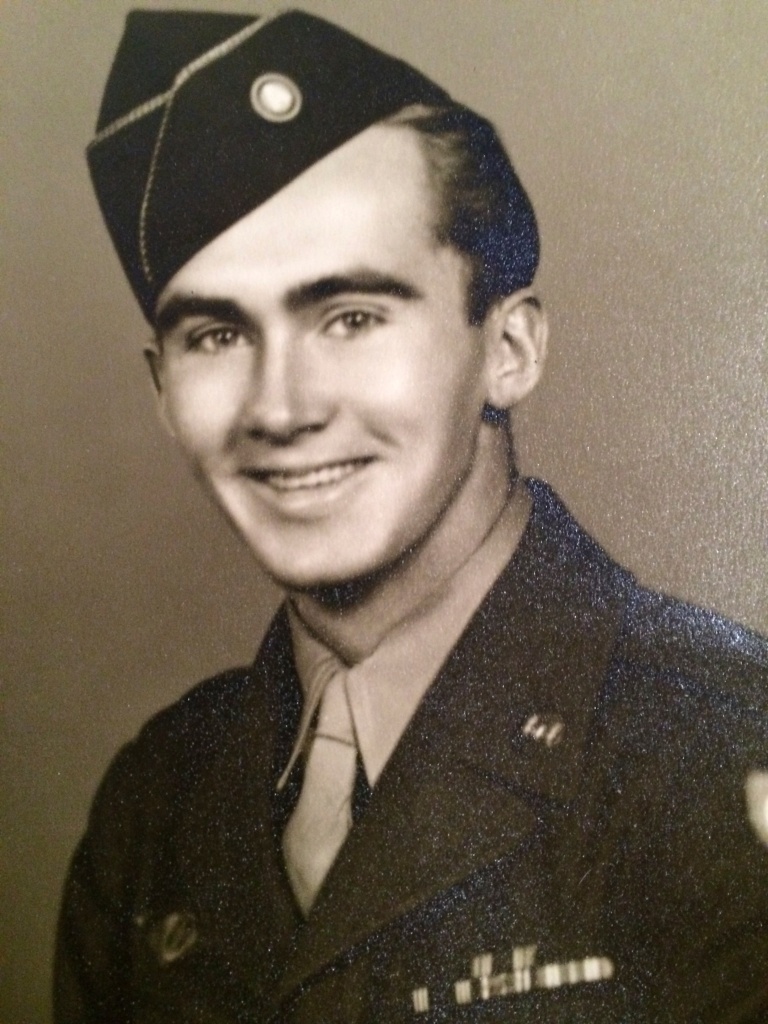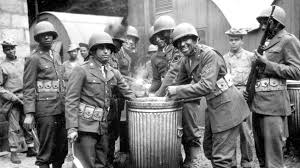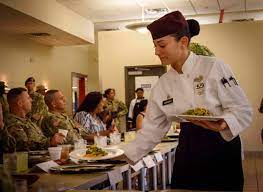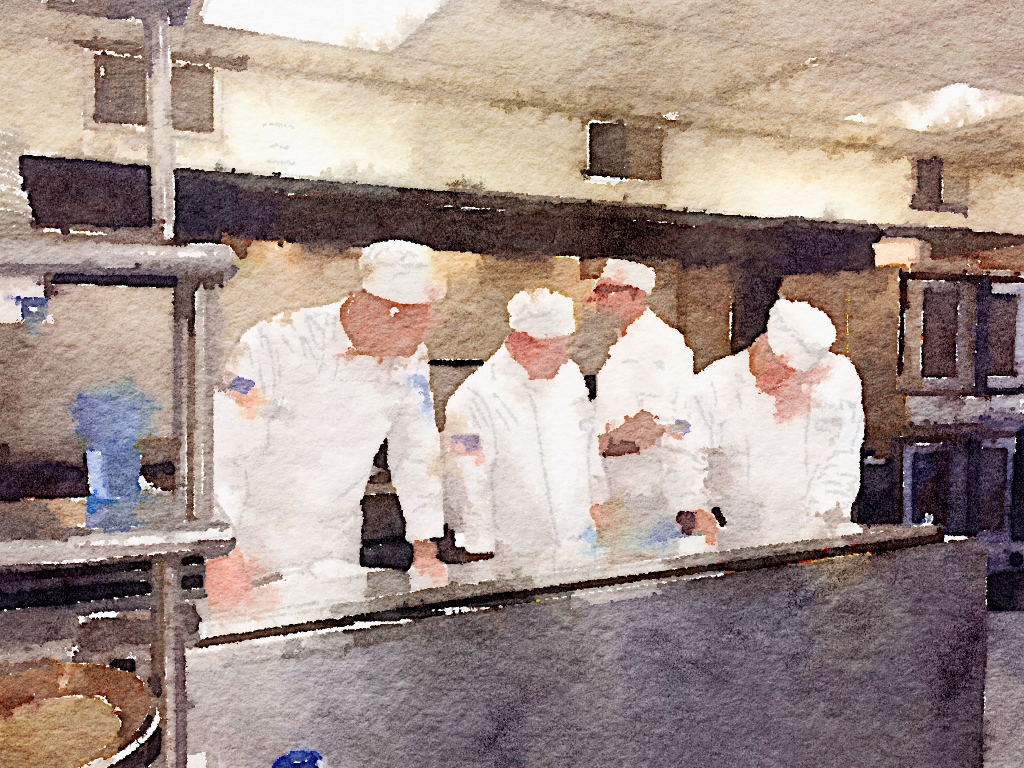
Being a chef is a tough job, no matter where a person hangs his or her apron. The physical, mental, and emotional challenges are significant, and the dedication and passion required are as pronounced as one might find in any field. More often than not, chefs are able to perform their duties with the expectation that they will have the resources, the facilities, and the predictability to function with their concentration placed squarely on the process; yet in some cases this is not always the reality that is before them.
To be quick on your feet, able to adjust, focused on quality while being thrust into dangerous situations, working in temporary/not quite ideal, kitchen spaces, and knowing full well just how important your work is physically, emotionally, and psychologically to a unique group of customers is something that many chefs are able to avoid in their busy lives. This is the life of the military cook.
Today is a day of recognition for those who have put their lives on the line, many who paid the ultimate sacrifice for their country; a day when we pay special homage to those who gave their lives in combat; but also, those who served under the constant threat of the same. It is also a day for us to consider the many individuals who worked diligently to protect and serve those who chose the military path.

It is very likely that each of us has a family history that includes individuals who served in the military and unfortunately, some who never returned home. Today specifically, but every day realistically, we should show our respect and give thanks for all who made the commitment of service. It may have been a father or mother, grandfather or grandmother, sister or brother, uncle, cousin or spouse; a child or neighbor, a classmate or friend, or simply a person in our community who left his or her mark – but it would be difficult to find a person who has not been touched by the tragedy associated with military service. We bow our heads today and honor each and every person who served out of choice as well as those who were thrust into combat through the draft.
I thought, given the nature of my blog, that I would also pay respect today to those cooks and chefs behind the scenes who gave their talent, passion, heart and soul to keeping soldiers nourished and offer them a few brief moments of enjoyment and reflection through food.
The military cook or chef is a special person who possesses the same skill set as the restaurant or resort chef, the same dedication to the profession, the same passion for ingredients and the same desire to present beautiful, delicious food to their audience, just as any other culinarian. This cook or chef may be responsible for nourishing troops in training at one of the bases across the country or overseas, or possibly work out of a field kitchen in the middle of a combat zone with the constant fear of attack to accompany the demands of the job. He or she may be focused on preparing thousands of meals every day or working on special events or officer dining that provide an opportunity to elevate their cuisine further. In all cases the food, just like in a restaurant, must be nutritious, hot or cold, fresh, flavorful and attractive.

Contrary to what some may perceive – military dining can run the full spectrum from field cooking under battle conditions, to quick service, banquets and catering, and even fine dining. There are formal training environments for all branches of the military – each with a focus on standards of excellence, competency, and building opportunities for long careers in foodservice. As an example – the Joint Culinary Center of Excellence for the Army and Marine Corps graduates more than 6,000 cooks each year to support their efforts domestically and abroad. Many of these cooks, after completing their terms of service, go on to become very successful and prominent chefs in the restaurant and food related industries.
On the representative side – the U.S. Military Culinary Team has consistently earned gold medals and the highest praise from their culinary peers in international competitions such as the Culinary Olympics.

Here are a few examples of chefs who had their start as a military cook in various branches of service in the U.S. and overseas:
Chef Andre Rush, a member of the U.S. Army served as a White House Chef through four administrations: Clinton, Bush, Obama and Trump.
Chef Eric Ripert of the 3-star Michelin Le Bernadin Restaurant served in the French Military before working as poissonier for Joel Robuchon leading to his position as chef of one of the few 3-star restaurants in America.
Julia Child was too tall for the military but instead worked for the Office of Strategic Service (predecessor to the CIA) as an intelligence officer.
Chef Bert Cutino – owner/chef of the famous Sardine Factory in Monterey, CA served his country in the naval reserves.
Chef John Besh of Besh Restaurants fame and a name synonymous with Cajun cooking, was a marine who served in the Gulf War.
Even Auguste Escoffier was a member of the French Military serving as a chef during the French/Prussian War. It was in the military where he devised the structure of the Kitchen Brigade that changed the way that kitchens operated.
In my own experience there have been many friends and associates who have dedicated the early portion of their careers to serving as military cooks and bakers. Among them, and there are undoubtedly many more, are:
Certified Master Chef Bill Franklin served in Vietnam as a member of the U.S. Navy.
Chef John McBride – a former student of mine, culinary instructor at Paul Smith’s College and New England Culinary Institute, and outstanding bread baker was a member of the U.S. Navy.
Chef Robert Brown, CMB who facilitated the Baking Program at Paul Smith’s College and served in the U.S. Navy during the Vietnam War.
Chef David Gotzmer, a former executive chef and culinary instructor at Paul Smith’s College was a member of the U.S. Marines during Vietnam.
Chef Michael Garnish, executive chef and former instructor at Paul Smith’s College and served in the U.S. Coast Guard.
Chef David Russ, former military culinary team member and captain, and military chef of the year served his country as a member of the U.S. Army during the Gulf War.
Chef Travis Smith served in culinary leadership roles for the U.S. Army, participated as a member of the military culinary team, and held various positions as executive chef and chef/entrepreneur since retiring from the Army.
Francis Peroni, my first foods instructor from Paul Smith’s College served in the military during World War II.
Chef Phil Learned, former executive chef of The Balsams Grand Resort and founder of their apprenticeship program was a U.S. Marine Corps during World War II and Korea.
Chef Keith Taylor of Zachary’s Bar-b-Que served in the U.S. Army before working as chef for Walt Disney and building a very successful cadre of restaurants in Philadelphia.
Chef Jeremiah Shields, a former student from New England Culinary Institute – served in the U.S. Army.
And the list goes on and on. I often reflect on my own time as a cook in the Army National Guard and the discipline I gained in the process. I treasured the opportunity to cook for those fellow soldiers who chose or were chosen to serve. On this day and every other I give thanks to those men and women who gave of themselves, those whose lives were changed as a result, and those who gave their lives for the freedoms, democratic process, and equities and advantages that we share and must protect.
*Pictures: My dad – WWII (not a cook)
Members of the Coast Guard Culinary Team in training
Military cooks in action
PLAN BETTER – TRAIN HARDER
Give thanks to those who served or serve currently.
Harvest America Ventures, LLC
http://www.harvestamericacues.com. BLOG
CAFE Talks Podcast

Leave a comment